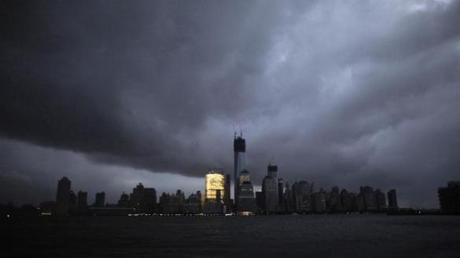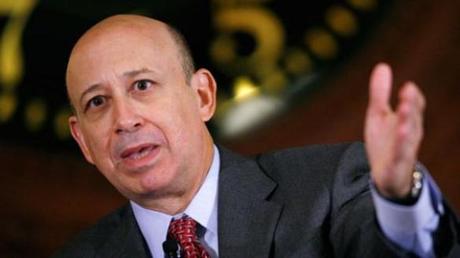By: Andrew Gavin Marshall
Originally posted at Occupy.com

Part 1: Exposing the Transnational Capitalist Class
Part 2: Identifying the Institutions of Control
Part 3: The Influence of Individuals and Family Dynasties
Part 4: Banking on Influence with JPMorgan Chase
Anyone who has paid even minimal attention to the global economic and financial crises gripping the world since 2007 has heard the name Goldman Sachs.
One of the largest banks in the United States, Goldman Sachs was central to the process of creating the housing bubble that popped in 2007-8, which led to the largest economic crisis since the Great Depression. As Matt Taibbi famously documented in Rolling Stone, Goldman has been involved in “every major market manipulation since the Great Depression,” profiting along the way as “a great vampire squid wrapped around the face of humanity, relentlessly jamming its blood funnel into anything that smells like money.”
Let’s go back to a little history.
In 2006 and 2007, as Goldman was selling high risk securities on home mortgages worth $40 billion, it was simultaneously betting against the housing market, ensuring that as the housing market crashed, the bank would make a significant profit. Thus, “the nation’s premier investment bank pass[ed] most of its potential losses to others before a flood of mortgage defaults staggered the U.S. and global economies.”
In late 2007, as the mortgage crisis was accelerating, executives at Goldman Sachs sent each other emails explaining that they would make “some serious money” betting against the housing market. Like a self-fulfilling prophecy, the bank helped the market crash harder and faster.
A U.S. Senate investigation into Goldman Sachs concluded that the bank “profited from the financial crisis [which it helped cause] by betting billions against the subprime mortgage market, then deceived investors and Congress about the firm’s conduct,” and referred the Securities and Exchange Commission (SEC) and the U.S. Justice Department to investigate the bank for criminal or civil action.
As Goldman’s CEO Lloyd Blankfein himself stated: “We focused a lot of ourselves on trying to benefit from the crisis that happened… we were going to use that opportunity to make ourselves a better firm.”
In 2012, however, President Obama’s Justice Department announced that it would not pursue criminal charges against the bank. This, after the bank received over $12 billion in bailouts from the U.S. government to save the bank from the crisis that it created and profited from.
This, after Goldman Sachs helped create the Greek debt crisis for which entire populations of European countries are being punished into poverty while allowing the bank (among other banks) to continue to profit from the deepening depression and crisis in Europe.
This, after Goldman Sachs (along with other investment banks) helped create a global food crisis by speculating on food prices, sending the prices sky-high, then making immense profits while tens of millions of people around the world were pushed into hunger and starvation.
Obama’s decision not to prosecute the bank, of course, had nothing to do with the fact that Goldman Sachs was one of the top contributors to the Obama campaign in 2008 and again to his re-election campaign in 2012.
CEO Blankfein turned more heads when he told CBS News in November of 2012: “You’re going to have to undoubtedly do something to lower people’s expectations – the entitlements and what people think that they’re going to get, because it’s not going to – they’re not going to get it.” Suggesting that benefits like social security, Medicare and Medicaid were providing too much “support” to everyday people, Blankfein explained that “entitlements have to be slowed down and contained… because we can’t afford them.”
Apparently, the fact that Goldman Sachs received more than $10 billion in government welfare in exchange for its role helping to create a national and global financial crisis did not strike Blankfein as hypocrisy. The lesson he imparted: there is plenty of money to support the bank but not old-age pensioners. Because as Blankfein lectured the public about its need to “lower expectations” and lose its social benefits, bonuses for Wall Street executives were going up, with Goldman Sachs’s bonuses and salaries for 2012 topping $13 billion.

Goldman’s Reach into Other Institutions
For the Global Power Project, we examined a total of 83 individuals at Goldman Sachs, including executives, the board of directors, and several advisory boards. The most highly represented institution was Harvard University, where 12 (or 14%) of the 83 individuals hold leadership positions.
Following Harvard was the Council on Foreign Relations, where 10 Goldman Sachs representatives are members. The University of Pennsylvania and the World Economic Forum each have five individuals sharing leadership positions with the bank; four individuals are affiliated with the Bilderberg Meetings, four with Columbia University; and three with the Federal Reserve Bank of New York, the Brookings Institution, Rockefeller University, the Nature Conservancy, the Securities Industry Association, and the World Bank.
And the list goes on from there, as Goldman Sachs shares two individual leadership positions or affiliations with Tsinghua University, Cornell University, the Partnership for New York City, Wal-Mart, the Aspen Institute, New York University, Fannie Mae, Yale University, the Carnegie Endowment for International Peace, the American Academy of Arts and Sciences, Credit Suisse, Oxford, Barnard College, Prudential, the Bank of England, EastWest Institute, the London School of Economics, the Trilateral Commission, DiamlerChrysler, the OECD, the Central Park Conservancy, the Museum of Modern Art, Caterpillar, the International Rescue Committee and the Asia Society. The bank also includes two former European Commissioners.
Goldman Sachs shares one leadership position – past or presently – with the following institutions: the Financial Services Forum, Catalyst, the Monetary Authority of Singapore, Stanford, Investor AB, Stockholm School of Economics, the President’s Foreign Intelligence Advisory Board, George W. Bush’s National Economic Council, ExxonMobil, Novartis, Honeywell International, Target, UnitedHealth Group, Perseus, EADS, PepsiCo, Royal Philips Electronics, Zurich Financial, PricewaterhouseCoopers, BP, Allianz, European Round Table of Industrialists, Royal Bank of Scotland, HSBC, Siemens, the Bank of Spain, IMF, the Group of Thirty, the Population Council, the European Central Bank, Princeton, Soros Fund Management, New York Stock Exchange, the Ford Foundation, Google, BHP Billiton, and the People’s Bank of China, among many others.
Meeting the Elites
There are several individuals holding leadership positions with Goldman Sachs who represent what we refer to as the global ruling class – or global plutocracy – by virtue of their multiple positions on numerous boards and advisory groups, think tanks, educational institutions, and other important institutions of influence, giving them unparalleled access to policy-makers around the world.
Let’s start with Goldman CEO Lloyd Blankfein, who has been chairman and CEO of the bank since 2006, and who is also a member of the Dean’s Advisory Board of Harvard Law School, a member of the Dean’s Council of Harvard University and is a member of the Advisory Board of Tsinghua University School of Economics and Management. Blankfein is also a member of the Board of Overseers of Weill Medical College at Cornell University, the board of directors of the Partnership for New York City, and is a member of the Council on Foreign Relations and the International Advisory Committee of the Federal Reserve Bank of New York. He is additionally a member of the board of Catalyst, Chairman of the Financial Services Forum and is a member of the International Advisory Panel of the Monetary Authority of Singapore.
Stephen Friedman is on the board of directors of Goldman Sachs and has been Chairman of Stone Point Capital since 2005. He was previously Chairman of President George W. Bush’s Intelligence Advisory Board and Intelligence Oversight Board from 2006 to 2008, and was Chairman of the Federal Reserve Bank of New York between 2008 and 2009. Friedman was also the Assistant to the President for Economic Policy and Director of the National Economic Council in George W. Bush’s White House from 2002 to 2004, and was previously the Chairman of Goldman Sachs. He is a Trustee of the Memorial Sloan-Kettering Cancer Center, a Trustee of Columbia University, a Trustee of the Aspen Institute, a former director of Wal-Mart and Fannie Mae, and is a member of the board of advisers of the Center for New American Security and the board of directors of the Council on Foreign Relations.
Also on the board of Goldman Sachs is Lakshmi N. Mittal, a director of ArcelorMittal, the world’s largest steel company, and is also a director of the European Aeronautic Defense and Space Company (EADS) N.V., as well as a member of the International Business Council of the World Economic Forum. He is a member of the Advisory Board of the Kellogg School of Management, a member of the Executive Committee of the World Steel Association, a member of the Foreign Investment Council of the Government of Kazakhstan, a member of the Indian Prime Minister’s Global Advisory Council, a member of the International Advisory Board to the President of Mozambique, and a member of the Domestic and Foreign Investors Advisory Council to the President of the Ukraine.
The Chairman of Goldman Sachs International is Peter D. Sutherland, former Attorney General of Ireland from 1981 to 1984, who was European Commissioner for Competition Policy in the EU from 1985 to 1989, after which he was Chairman of Allied Irish Banks from 1989 to 1993. Between 1990 and 1995, Sutherland was Chairman of the European Institute of Public Administration, and was the Director-General of the General Agreement on Tariffs and Trade (GATT) from 1993 and the first Director-General when it became the World Trade Organization (WTO), which he led until 1995. Sutherland was the Chairman of BP from 1997 to 2009, the former CEO of Ericsson, a former Director of the Royal Bank of Scotland, and former Chairman of the General Assembly and President of the Advisory Council of the European Policy Center. Sutherland was additionally the former European Chairman of the Trilateral Commission from 2000 to 2009, and remains at the Trilateral Commission as a member and Honorary European Chairman. He was previously the Vice Chairman of the European Round Table of Industrialists, from 2006 to 2009. He is a member of the Foundation Board of the World Economic Forum, the Supervisory Board of Allianz SE, a member of the boards of BW Group and Koc Holding, and President of the Federal Trust. He is a former member of the Council of International Advisors to the Chief Executive of Hong Kong, ia member of the Board of Directors Emeriti of the European Institute, and is on the International Advisory Board of BritishAmerican Business. Sutherland is also the Special Representative of the Secretary-General of the UN for Migration and Development and has been the Consultor of the Extraordinary Section of the Administration of the Patrimony of the Apostolic See (financial adviser to the Pope).
Senator Judd Gregg, a member of the International Advisory Board of Goldman Sachs, is a former member of the U.S. House of Representatives from 1980 to 1988, former Governor of New Hampshire from 1989 to 1993, and a U.S. Senator from 1993 to 2011. As a Senator, Gregg was the Chief Negotiator for the Emergency Economic Stabilization Act of 2008 (the bailout bill), and is a member of President Obama’s Bipartisan National Commission on Fiscal Responsibility and Reform. He is also a Senior Adviser to New Mountain Capital, and is on the boards of IntercontinentalExchange and Honeywell International.
Another member of Goldman Sachs’ International Advisory Board is Lord Griffiths of Forestfach, a member of the British House of Lords and member of the board of directors of Times Newspaper Holdings Ltd and Telereal Trillium. He is Vice Chairman of Goldman Sachs International, was a former Professor at the London School of Economics, former Dean at City University Business School, and was a director of the Bank of England from 1983 to 1985. Between 1985 and 1990, he was the head of Prime Minister Margaret Thatcher’s Policy Unit, where he “was a chief architect of the government’s privatization and deregulation programs.” In 2009, following a record-breaking $22 billion that was given out to Goldman Sachs executives and leadership in payment and bonuses, Lord Griffiths told a British audience that they should “tolerate the inequality as a way to achieve greater prosperity for all.”
Victor Halberstadt, a member of the International Advisory Board of Goldman Sachs, is also a Professor of Economics at Leiden University in the Netherlands, and former Crown-Member of the Netherlands Social-Economic Council. He is former Chairman of the International Advisory Board of DiamlerChrysler, former advisor to the Secretary-General of the OECD, former member of the Council on Defence for the Government of the Netherlands, and former Informateur to the Queen of the Netherlands, as well as the former President of the International Institute of Public Finance. Halberstadt is a former Honorary Secretary-General of the Bilderberg Meetings, where he remains as a member of the Steering Committee, and is a director of ING Group, Stork, DiamlerChrysler, KPN and PA Consulting Group. He is a member of the board of Koc University, the Lee Kuan Yew School for Public Policy in Singapore, and a member of the Board of Trustees of the Population Council. He is additionally Chairman of the Board of the American European Community Association (AECA), a member of the board of the Netherlands Opera and is a member of the Faculty of the World Economic Forum.
A Senior Director of Goldman Sachs is John C. Whitehead, who was former U.S. Deputy Secretary of State in the Reagan administration from 1985 to 1989, the founding Chairman of the Lower Manhattan Development Corporation, and was an employee, partner, Co-Chairman and Senior Partner for Goldman Sachs between 1947 and 1976. He is a former member of the board of directors of the New York Stock Exchange, former Chairman of the Securities Industry Association, former Chairman of the Board of the Federal Reserve Bank of New York, former Chairman of the United Nations Association, the International Rescue Committee, International House, the Andrew W. Mellon Foundation, and former Chairman of the Harvard Board of Overseers. Whitehead is an Honorary Life Trustee and former Chairman of the Asia Society, Chairman Emeriti of the International Rescue Committee, a former director of the Nature Conservancy, a board member emeriti of the Watson Institute for International Studies and a director emeriti of the EastWest Institute. He is former Chairman of the Hungarian-American Enterprise Fund, a former member of the Steering Committee of the Bilderberg Meetings, Chair Emeriti of the Brookings Institution, a Commissioner of the Global Commission on Drug Policy, a member of the board of the National September 11th Memorial and Museum at the World Trade Center and is a member of the Council on Foreign Relations.
It’s not surprising that with individuals like Stephen Friedman, Peter Sutherland and John C. Whitehead holding leadership positions with Goldman Sachs, the bank has established a highly influential network of affiliations with some of the world’s major institutions and policy-makers. The “vampire squid” has indeed spread its tentacles far beyond mere financial influence; through its affiliations with global plutocrats who serve on its boards, Goldman is a cosmopolitical conglomerate with ever-expansive power.
Even mother nature can’t seem to take on Goldman Sachs. When Hurricane Sandy hit New York City in November of 2012, power was knocked out for more than 1 million New Yorkers. But the bank’s 200 West Street headquarters were shining bright, “lights glowing and music playing.” With heaps and sandbags surrounding the building and generators running, Goldman sent off a lone, ominous blue glow into the stormy night: a symbol to all that even in the worst of circumstances, amid a sea of human suffering, Goldman Sachs remains ever present, lights on…doing business and making money.
Andrew Gavin Marshall is a 26-year old independent researcher and writer based in Montreal, Canada. He is Project Manager of The People’s Book Project, head of the Geopolitics Division of the Hampton Institute, the research director of Occupy.com’s Global Power Project, and has a weekly podcast with BoilingFrogsPost.


